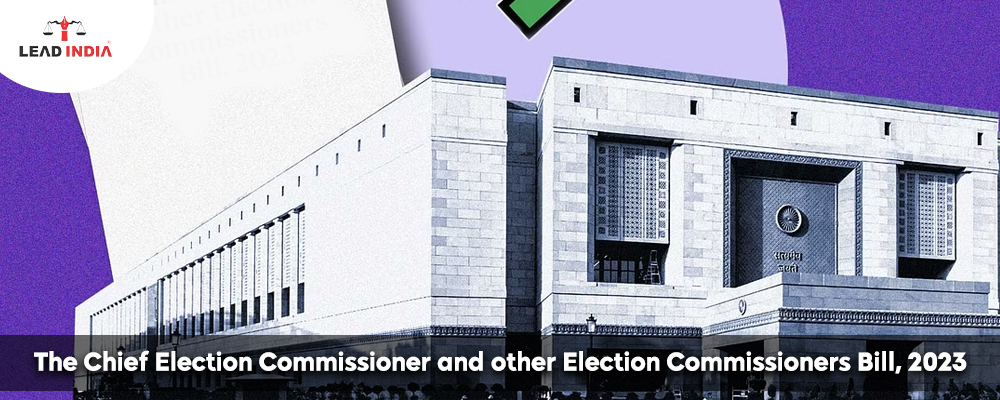The Rajya Sabha has passed the Chief Election Commissioner and Other Election Commissioners (Appointment, Conditions of Service, and Term of Office) Bill, 2023, which details the process for appointing Chief Election Commissioner (CEC) and the Election Commissioners (EC).
The legislation seeks to increase transparency in the appointment process in response to an order from the Supreme Court of India in the Anoop Baranwal v Union of India case, 2023
What is the Supreme Court’s ruling on CEC and EC appointments?
- In March 2023, the Supreme Court underlined the crucial significance of an independent Election Commission of India (ECI) in ensuring free and fair elections, filling a legislative void that had existed since the Constitution’s promulgation governing the appointment of the CEC and ECs.
- The Supreme Court called attention to other organizations that promote constitutional democracy and have independent methods for appointing heads/members. Examples include the National and State Human Rights Commissions, the Central Bureau of Investigation (CBI), the Information Commission, and the Lokpal.
- The Supreme Court took note of proposals from the Dinesh Goswami Committee on Electoral Reforms (1990) and the Law Commission’s 255th report on Electoral Reforms (2015). Both committees proposed a committee composed of the Prime Minister, the Chief Justice of India (CJI), and the Leader of the Opposition to nominate the CEC and ECs.
- The Supreme Court, exercising its powers under Article 142 (to make directions for doing ‘full justice’ in any matter), established that the CEC and ECs would be nominated by a committee comprised of the Prime Minister, the CJI, and the Leader of the Opposition or the largest opposition party in the Lok Sabha. The Supreme Court determined that this system would remain in effect until Parliament enacted legislation on the topic.
Need A Legal Advice
The internet is not a lawyer and neither are you. Talk to a real lawyer about your legal issue

What Are the Chief Election Commissioner and other Election Commissioners Bill, 2023 Key Provisions?
The Bill is intended to replace the Election Commission (Conditions of Service of Election Commissioners and Transaction of Business) Act of 1991. It covers the appointment, compensation, and dismissal of the CEC and ECs.
- Appointment Process: The President shall appoint the CEC and ECs based on a Selection Committee’s proposal. The Prime Minister, a Union Cabinet Minister, and the Leader of the Opposition/leader of the largest opposition party in the Lok Sabha shall make up the Selection Committee. Even if there is a vacancy on the Selection Committee, its recommendations will remain valid. A search committee led by the Cabinet Secretary will recommend a list of candidates to the Selection Committee. Eligibility for the positions involves holding (or having held) a position equivalent to Secretary of the Central Government.
- Salary and conditions for CECs and ECs: It will be equivalent to those of the Cabinet Secretary. According to the 1991 Act, it was equivalent to the income of a Supreme Court Judge. The Bill retains a constitutional provision (Article 324(5)) that allows the CEC to be dismissed, similar to a Supreme Court Judge. However, ECs can only be removed if recommended by them.
- The bill protects CECs and ECs from legal prosecutions for actions taken during their term, as long as they were performed in the course of their official duties. The amendment was intended to protect these individuals from civil or criminal prosecutions relating to their official duties.
What are the Bill’s Main Concerns?
- Allowing the Selection Committee’s recommendations to be legitimate even when there is a vacancy may lead to a monopoly of ruling party members, compromising the committee’s diversity and independence.
- Comparing the salaries of the CEC and ECs to those of the Cabinet Secretary, whose compensation is chosen by the executive, raises worries about potential government influence. Unlike the remuneration of a Supreme Court Judge, which is set by an Act of Parliament, this change may jeopardize the EC’s financial independence.
- Restricting eligibility to those who have held a position equivalent to the Secretary of the Treasury may eliminate otherwise eligible candidates, reducing the ECI’s range of backgrounds and expertise.
- The Bill keeps the constitutional clause that allows the CEC to be dismissed, similar to a Supreme Court Judge, whereas ECs can only be removed on the CEC’s suggestion. This lack of symmetry in removal procedures may raise concerns about fairness.
Lead India provides free legal advice, internet information, and other legal services. We offer a forum where you may talk with a lawyer and ask legal questions. Lead India’s Lawyers may assist you with any legal matters. Lead India’s solicitors can help you with any legal concerns. Lead India also offers free online legal help in India. In addition to providing online legal aid, Lead India allows users to ask specialist inquiries for free.





 Talk to a Lawyer
Talk to a Lawyer